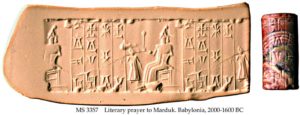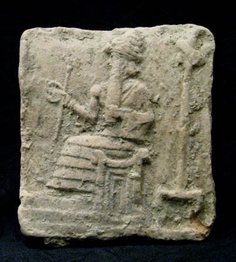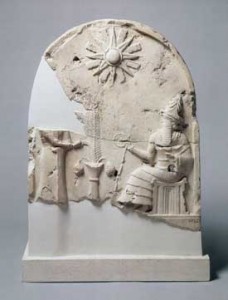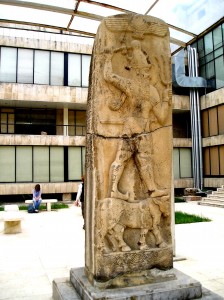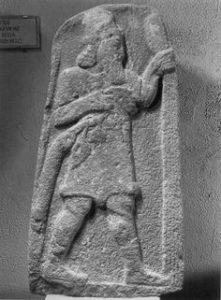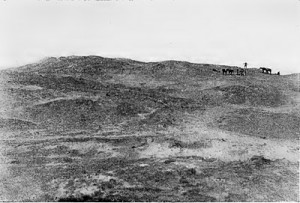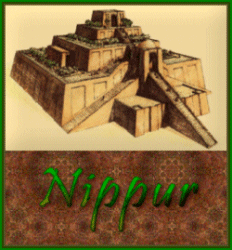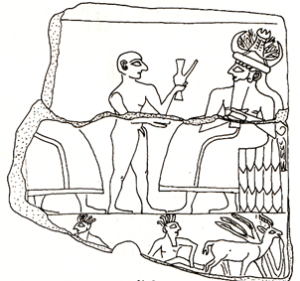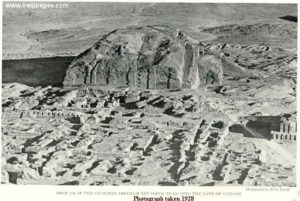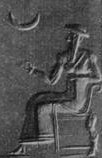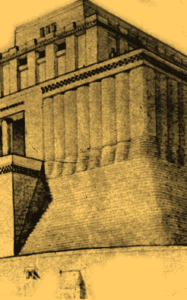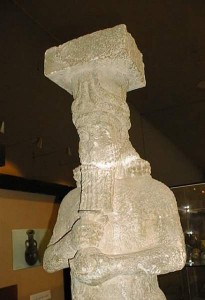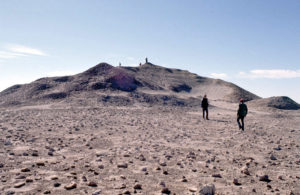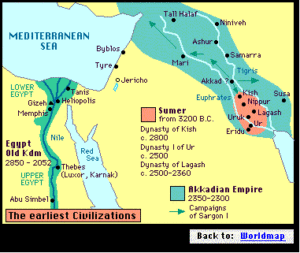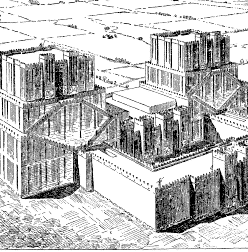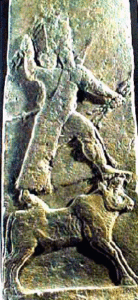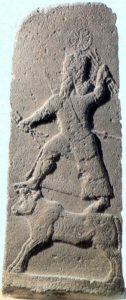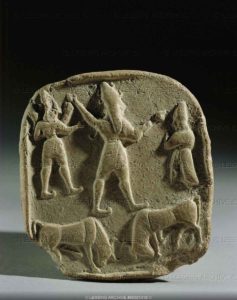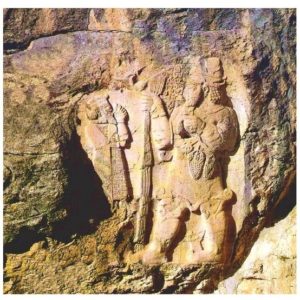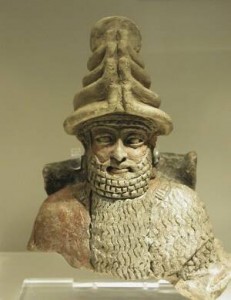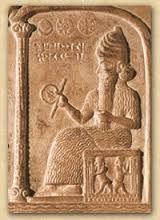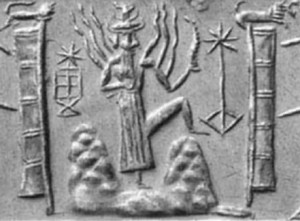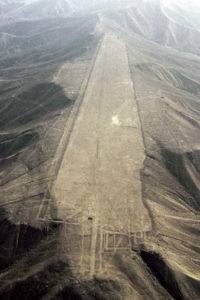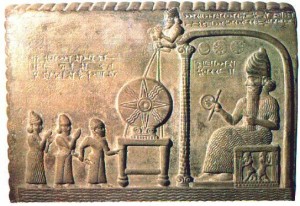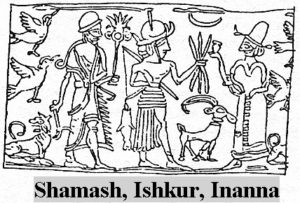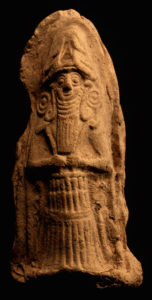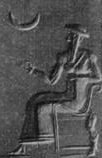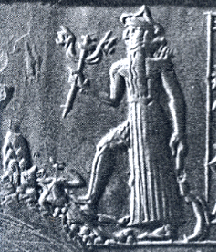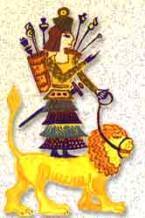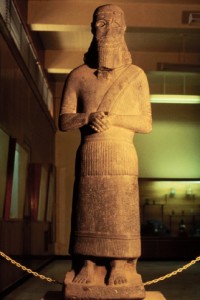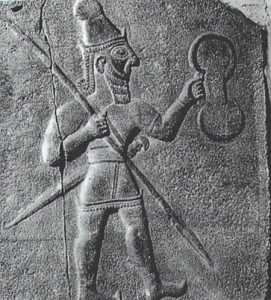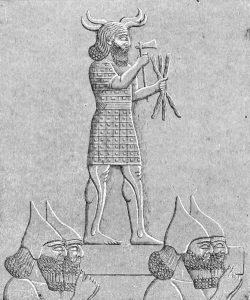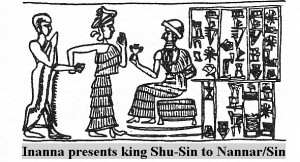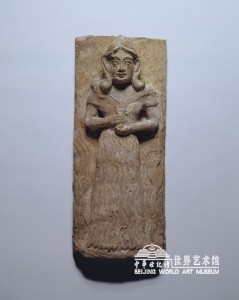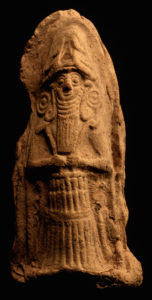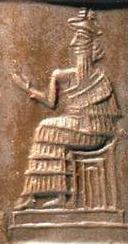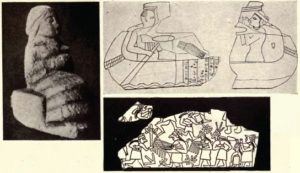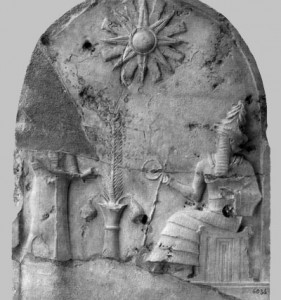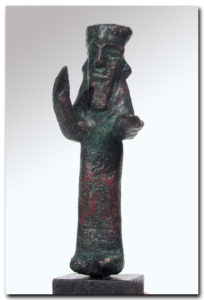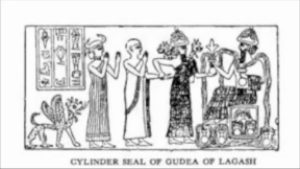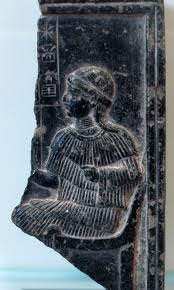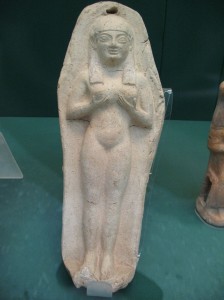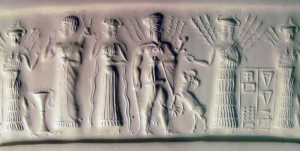http://www.gatewaystobabylon.com/religion/phoenician2.html
By Wilfred Davies and G. Zur From The Phoenician Letters (Davies and Zur, Mowat Publishing, Manchester, 1979)
The most complete description of Adad can perhaps be found in The Phoenician Letters, and we quote now from some of this master work:
(Texts: All Artifacts, Color Coding, & Writings in Bold Type With Italics Inside Parenthesis, are Added by Editor R. Brown, not the Authors, Translators, or Publishers!)
(gods in blue)
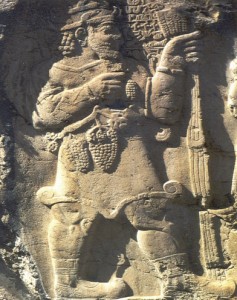 (giant alien god Adad, 3rd son to Earth Colony Commander Enlil)
(giant alien god Adad, 3rd son to Earth Colony Commander Enlil)
a) Adad as the Shaper of Elemental forces, who therefore gives physical manifestation to them:
“Rimon (Adad) strikes the earth and the mountains fall, the plains rise as mountains;
He breathes and the storm flies before Him, sighs and the gentle rain descends upon the earth.
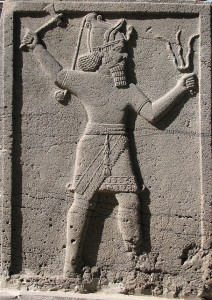 (Adad with his high-tech alien weaponry, Thunder God for most all cultures in history)
(Adad with his high-tech alien weaponry, Thunder God for most all cultures in history)
He throws the thunderbolt and the heavens crack asunder.
He strikes the air as a workman strikes his flint, behold the flash blinds the multitude.
The seas flow forth upon the land and the land sinks beneath the sea.
He smiles and the birds sing, corn grows (in Mesopotamia!), and there is food for all
and the sun falls pleasant upon the face.”
b) Manifestation of His power: “Look up into the heavens at night.
See Him scatter the grains, the golden grains of the stars, upon the fields of heaven;
Rimon (Adad) is seeding the heavens.
Count the stars in the sky, these are the plants he tends;
He breaks the clouds of the heavens when there is need.
He is air and the fire, the water and the earth;
he mixes the fire and the earth and the mountains run like water,
and the smoke of his furnace ascends unto the heavens.
All things in the heavens and the earth are mixed by him.
He is the land we live in, he is our bodies, our blood, flesh, and life.
Without air we die quickly, without warmth it takes longer,
without water and earthly food we die after a little while.
These things cannot be taken away from us, for they are our life.
They are his gifts, in them and on them and in them we live”.
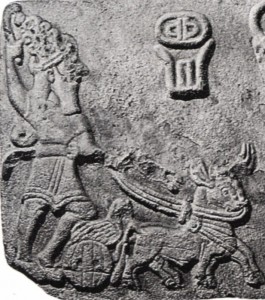 (Adad riding the air in his sky-chariot, with his Taurus the Bull zodiac symbol)
(Adad riding the air in his sky-chariot, with his Taurus the Bull zodiac symbol)
Adad / Rimon and the King:
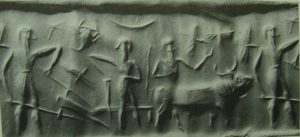 (earthlings taught to farm for the gods)
(earthlings taught to farm for the gods)
“Now, as future king, one of your titles will be “Tenant farmer of the God,”
and this is both your position and the position of all men.
We are all tenants, stewards of his gifts; you as monarch are steward of the realm during your lifetime.
Ignorant people think that they own the land.
It was there before them and it will be there when they are buried with their fathers.
Ignorant kings think that families own the land, but families also die in time.
None can do good without land and water, warmth and air,
O tenant farmer of the god.
A man is entitled to the results of his work while he lives,
but all his effort, without land, will be as nothing, for we cannot produce anything without it. “…
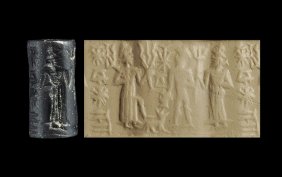
(Adad with alien technologies, semi-divine king getting instructions from his god, & Nergal with his alien weaponry)
“The king’s duties are to give justice, control the strong, aid the weak,
steward the land, and to defend the people against the covetous and violent
who would take by force the fruit of the other mens’ labor.
To aid him in his work he has priests and councilors, servants and the army.
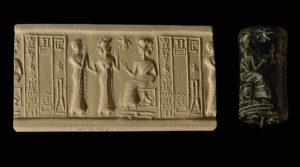
(high-priest & king Ur-Nanshe, his goddess-spouse Inanna – Goddess of Love, & Inanna‘s mother Ningal seated on her throne in Ur)
The priests hold the times;
the councilors of the state hold the knowledge of men and interpret their moods to the king.
The army and the king’s servants put the judgments of the king into practice.”…
“Now it is the work of kings to foster this growth,
for only by so doing may a king become a great man himself.
And the conditions for this growth are freedom, justice, leisure and instruction.
If the conditions are good, skills develop, men specialize and co-operate, exchanging their skills
so that they may be fewwd from the necessity of being their own diggers and planters,
reapers and threshers, tailors and shoemakers, carpenters and smiths.
Then together they may produce enough for all to enjoy the fruits of their labors
and be free to devote themselves to discovering their own abilities and natures”.
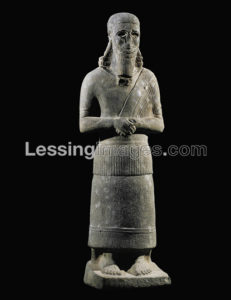 (Enlil’s appointed son Adad as the Canal Inspector of Sumer)
(Enlil’s appointed son Adad as the Canal Inspector of Sumer)
Adad as the Water Baliff of the Lord: “Now, my Prince, see and comprehend:
all is the god’s, and his people appoint over themselves a judge,
a steward, a ruler in his place, so that all may share in the wealth of the god.
Thus in our land no man may own the land he works on, or the water,
no man, not even the king or the priests,
and each man shares in the produce of all according to his labors,
giving a portion to the god, from which the god provides for those who cannot labor.
Each person who is fed from the god’s share has, therefore, duties according to his station.”
It is important to point out that the origin for this title may very well be in the Sumerian myth of “Enki and the World Order“, where Enki puts Ishkur, the Sumerian Adad / Rimon in charge of inspecting the canals of heaven and earth, of rain and clouds, storms and lightning, showing the importance in controlling the elements that enable agriculture and abundant harvests, which were vital for South Mesopotamia in special.
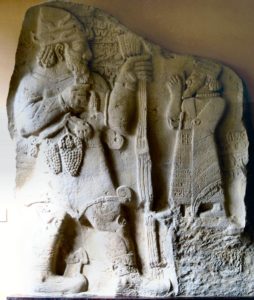 (giant alien god Adad, & smaller Anunnaki-earthling, semi-divine descendant appointed to kingship)
(giant alien god Adad, & smaller Anunnaki-earthling, semi-divine descendant appointed to kingship)
Adad as the fruits of the Kingdom:
“But the basis, the foundation of all this, is the free access to land and warmth and water and air.
All the products of man’s labors are the field of Adad / Rimon;
for men, by their arts, control for themselves the combinations of the elements,
the mixtures of air and water, and fire and earth, that are the gifts of Rimon.
Men build their cities to protect themselves from his moods;
they make wells and irrigate the land, wall, and shelters guard their seeds from tempest,
they store the rains, they dig the earth and melt the rocks for metal, they embody in themselves Rimon.
From a man and a woman come great nations, from one life many lives.
A man can kill or nurture, free or enslave.
So it is with us; we are Rimon; all is Anu.”
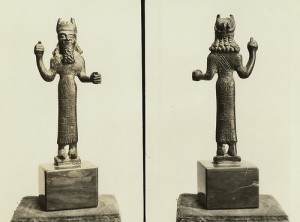 (Adad / Ishkur / Rimmon / Rimon)
(Adad / Ishkur / Rimmon / Rimon)
“Therefore when you go up into the temple of Rimon and bow before his image,
remember you are bowing, as all men must bow, to the oceans, the rivers, the plains and the mountains,
the sun, the moon and the stars, the spaces between the stars,
the spaces between the clouds in the air and the clouds in the heavens.
All that can be seen with the eyes, heard with the ears, smelt, touched, tasted, and felt by the body,
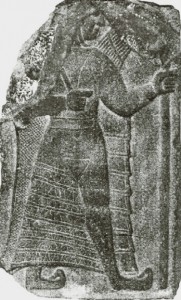
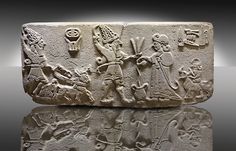
(alien Anunnaki King Anu‘s daughter Shala; Adad with his aunt-spouse Shala)
all this is the god Rimon (Adad) and his wife Shalla, the corn goddess, (corn from the Americas?)
the compassionate one; they are the earthly presence of the great gods.”
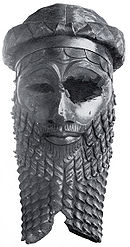 (Sargon The Great, “hero of old, man of renown, chosen by the Goddess of Love, Inanna)
(Sargon The Great, “hero of old, man of renown, chosen by the Goddess of Love, Inanna)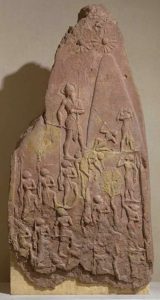 (mixed-breed giant Naram-Sin, outside a landed command module – flying shem of the Anunnaki gods)
(mixed-breed giant Naram-Sin, outside a landed command module – flying shem of the Anunnaki gods)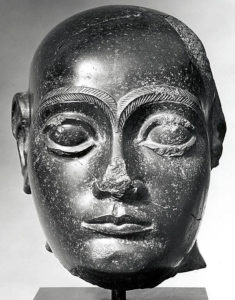
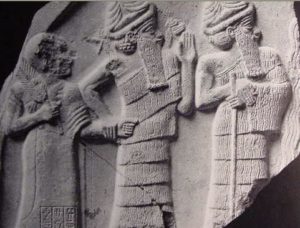 (Gudea; Gudea, Ningisgzidda, Dumuzi, & Enki missing)
(Gudea; Gudea, Ningisgzidda, Dumuzi, & Enki missing)